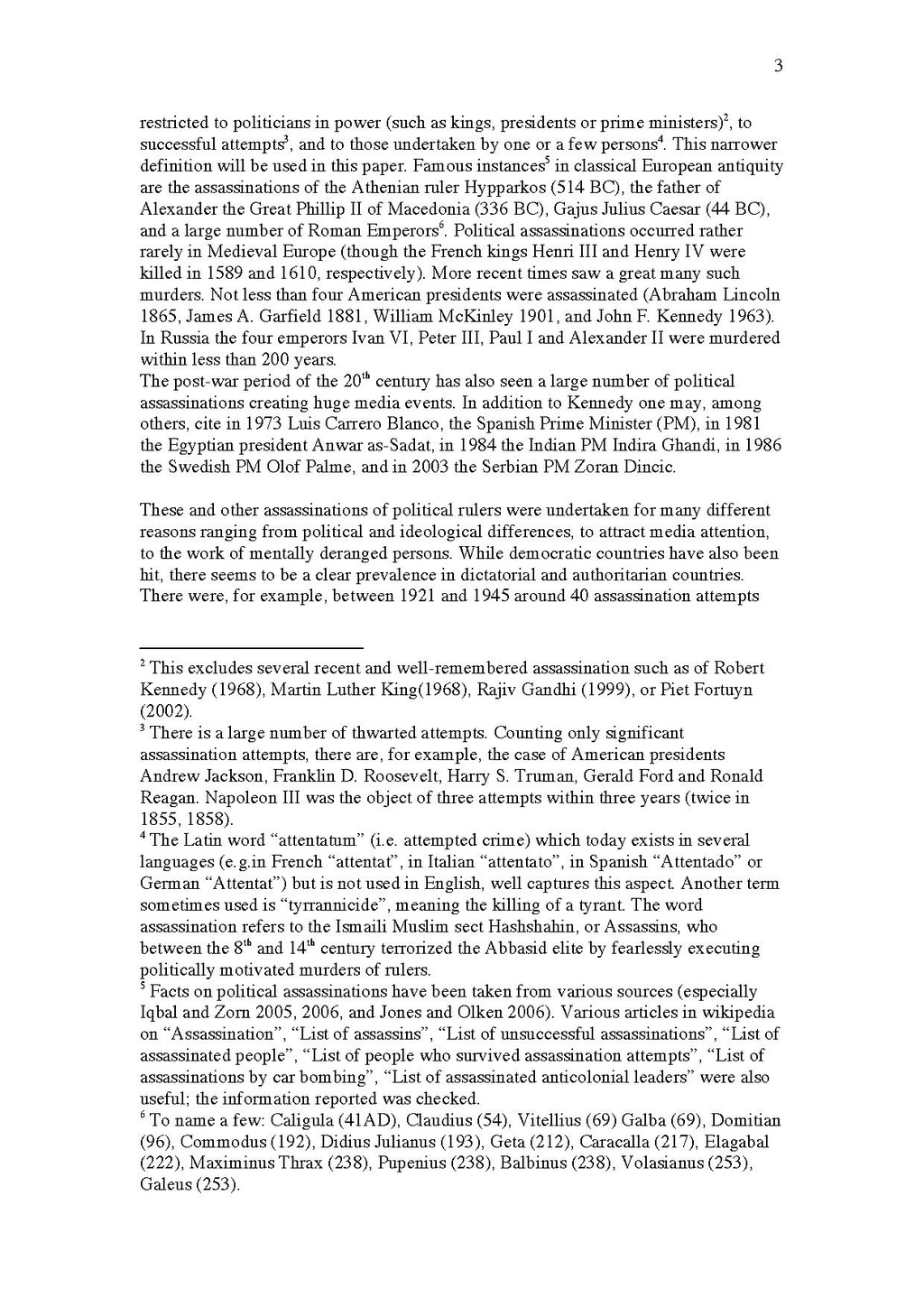restricted to politicians in power (such as kings, presidents or prime ministers)?, to successfUL attempts”, and to those undertaken by one or a few persons". This narrower definition will be used in this paper. Famous instances in classical European antiquity are the assassinations of the Athenian ruler Hypparkos (514 BC), the father of Alexander the Great Phillip II of Macedonia (336 BC), Gajus Julius Caesar (44 BC), and a large number of Roman Emperors". Political assassinations occurred rather rarely in Medieval Europe (though the French kings Henri III and Henry IV were killed in 1589 and 1610, respectively). More recent times saw a great many such murders. Not less than four American presidents were assassinated (Abraham Lincoln 1865, James A. Garfield 1881, William McKinley 1901, and John F. Kennedy 1963). In Russia the four emperors Ivan VI, Peter III, PaUL I and Alexander II were murdered within less than 200 years. The post-war period of the 20th century has also seen a large number of political assassinations creating huge media events. In addition to Kennedy one may, among others, cite in 1973 Luis Carrero Blanco, the Spanish Prime Minister (PM), in 1981 the Egyptian president Anwar as-Sadat, in 1984 the Indian PM Indira Ghandi, in 1986 the Swedish PM Olof Palme, and in 2003 the Serbian PM Zoran Dincic.
These and other assassinations of political rulers were undertaken for many different reasons ranging from political and ideological differences, to attract media attention, to the work of mentally deranged persons. While democratic countries have also been hit, there seems to be a clear prevalence in dictatorial and authoritarian countries. There were, for example, between 1921 and 1945 around 40 assassination attempts
3
2 This excludes several recent and well-remembered assassination such as of Robert Kennedy (1968), Martin Luther King(1968), Rajiv Gandhi (1999), or Piet Fortuyn (2002).
There is a large number of thwarted attempts. Counting only significant assassination attempts, there are, for example, the case of American presidents Andrew Jackson, Franklin D. Roosevelt, Harry S. Truman, Gerald Ford and Ronald Reagan. Napoleon III was the object of three attempts within three years (twice in 1855, 1858). 4 The Latin word “attentatum” (i.e. attempted crime) which today exists in several languages (e.g.in French “attentat”, in Italian “attentato”, in Spanish “Attentado” or German “Attentat”) but is not used in English, well captures this aspect. Another term sometimes used is “tyrrannicide”, meaning the killing of a tyrant. The word assassination refers to the Ismaili Muslim sect Hashshahin, or Assassins, who between the 8th and 14th century terrorized the Abbasid elite by fearlessly executing politically motivated murders of rulers.
Facts on political assassinations have been taken from various sources (especially Iqbal and Zorn 2005, 2006, and Jones and Olken 2006). Various articles in wikipedia on “Assassination”, “List of assassins”, “List of unsuccessfUL assassinations”, “List of assassinated people”, “List of people who survived assassination attempts”, “List of assassinations by car bombing”, “List of assassinated anticolonial leaders” were also usefUL; the information reported was checked. 6 To name a few: Caligula (41AD), Claudius (54), Vitellius (69) Galba (69), Domitian (96), Commodus (192), Didius Julianus (193), Geta (212), Caracalla (217), Elagabal (222), Maximinus Thrax (238), Pupenius (238), Balbinus (238), Volasianus (253), Galeus (253).
5
